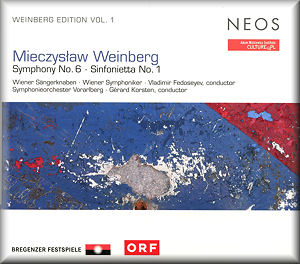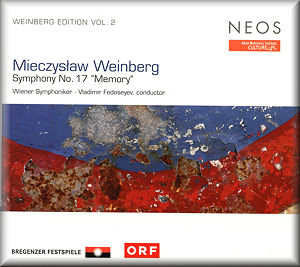 |
 |
|


alternatively
CD: MDT
AmazonUK
AmazonUS
|
Mieczyslaw
WEINBERG (1919-1996)
Weinberg Edition - Volume 1
Symphony No. 6 for boys’ choir and orchestra op. 79 (1962-63) [44:11]
Sinfonietta No. 1 in D minor op. 41 (1948) [22:47]
 Wiener Sangerknaben/Gerald Wirth
Wiener Sangerknaben/Gerald Wirth
Wiener Symphoniker/Vladimir Fedoseyev
Symphonieorchester Vorarlberg/Gerard Korsten (Sinfonietta)
rec. live, Bregenz, 1, 15 August 2010
SACD Hybrid Multi-channel
 NEOS
NEOS  NEOS11125 [66:59]
NEOS11125 [66:59] 
|
|


alternatively
CD: MDT
AmazonUK
AmazonUS
|
Mieczyslaw WEINBERG (1919-1996)
Weinberg Edition - Volume 2
Symphony No. 17, Memory Op. 137 (1982-84) [53:01]
 Wiener Symphoniker/Vladimir Fedoseyev
Wiener Symphoniker/Vladimir Fedoseyev
rec. live, Bregenz, 25 July 2010
SACD Hybrid Multi-channel
 NEOS
NEOS  NEOS11126 [53:01]
NEOS11126 [53:01] 
|
|
|
These recordings are the first and second in what I hope will
be a series emanating from the Bregenz Festival. The Festival
also saw the stage premiere of Weinberg’s opera The Passenger
now enjoying an eight night run at the ENO. The ambitious
Requiem was also performed. The Passenger (1967-8)
is based on a disturbing story in which a former Auschwitz guard
by chance meets one of ‘her prisoners’ on an ocean liner. The
production is by David Pountney who supplies a brief preface
to the notes for each of these NEOS CDs. There are to be other
performances of The Passenger in Wielki Teatr, Warsaw
and Teatro Real, Madrid. It’s time has clearly come and surely
a recording cannot be too far behind. There are six other operas
as well as 22 symphonies and 17 string quartets.
Weinberg, also shown in previous times in Russianised form as
‘Moishe Vainberg’ first emerged for many LP listeners in the
1970s on EMI-Melodiya ASD 2755. Kogan was the soloist in the
Violin Concerto and Kondrashin conducted the Fourth Symphony.
That coupling was reissued on CD on Olympia OCD622. Olympia,
during the 1980s and until about 2003, issued a ‘Vainberg Edition’
the symphonic volumes of which numbered OCD471 (6, 10), OCD472
(7, 12), OCD589 (18, 19) and OCD590 (17). These are now difficult
to find and/or prohibitively expensive on ebay or Amazon. However
they have been joined by a new generation of CDs from Chandos
who have produced recordings of symphonies 1
and 7, 3,
4,
5,
14
and 16 as well as some of the concertos.
Add to this harvest home the Northern
Flowers CD of Symphony No. 1 and Alto’s
revivification of two Olympias of the chamber symphonies
and Symphony No. 2. The Manchester-based Danel Quartet who also
performed at the Bregenz Festival have a cycle of the quartets
with CPO: The five CPO volumes of the Weinberg: String Quartets
are: Volume 1: 7773132; Volume 2: 7773922;
Volume 3: 7773932; Volume 4: 7773942; Volume 5: 7775662. The
Piano Quintet is on a Nimbus
disc.
The Sixth Symphony - unlike the 17th - is in five
movements and is laid out for boys choir and orchestra. The
choir sings three poems two of them being by dissenting poets.
The last - used in the finale - deploys a poem that would have
sung directly and compliantly to the Soviet regime. The words
are not reproduced in the booklet which is a shame - a small
shame. War and the holocaust arch over this music and over the
eight and ninth symphonies. It should be borne in mind that
the composer’s parents and sister died in the Warsaw ghetto
and that the symphony was contemporaneous with the Cuban missile
crisis. The music is grave and serious however within this consistent
intensity Weinberg’s ideas range freely and in splendid and
ear-intriguing variety. There’s a suggestion of klezmer nostalgia
at 9.00 in the first movement which ends with sustained strings
and quiet intoning of the solo clarinet. The second movement
sometimes recalls Orff and the Britten Spring Symphony.
The singing is fine, soft yet incisive. Weinberg paints with
a nuanced palette balancing furious and serene. There are however
some garish moments where orchestra and choir have pari passu
roles. The third orchestra-only movement is explosive with
high-shrieking woodwind. This is raucously active writing suggestive
of Shostakovich. It has a somewhat fugal character at times.
It ends on a bell’s resonance from which emerges the fourth
movement. This is a Largo – bleak and high tensile – setting
words by Shmuel Halkin on the subject of the Nazis’ massacre
of the Kiev Jews – a subject also addressed in Shostakovich
13 Babi Yar, written in 1962. Tenderness and sunlit misty
fields float into vision. If you enjoy Britten Spring Symphony
or the Mathias This Worldes Joie then this should
appeal strongly. That said, its corrosive acid bites to the
bone and deeper than either comparator work. This acerbic face
is hardly softened by the optimism of many sections of V even
if we are confronted with gentle invocatory hymns to a unity
that arches over Volga, Mekong and Mississippi. Sun and mists
mingle in seraphically murmured peace as the work closes.
The four movement Sinfonietta No. 1 is in the outer movements
brilliant, dynamic, ethnic and jolly. This is folk-inspired
material with Prokofiev’s sharp accent and a Khachaturian whirl.
It’s not a work of the profundity of the symphonies. Its arena
is concerned with the enjoyably recreational. The second movement
is more poetic and partakes of the same tributaries as the start
of the finale of the Sixth Symphony. The jolly little Allegretto
burbles smilingly in the first Klezmer echo – a touch of the
dances of Kodaly. The Vorarlberg orchestra play it with élan
and with a temperate yield.
Weinberg’s symphonies 17-19 share a collective schema: The
Threshold of War. All three were recorded in Soviet readings
by Fedoseyev who has a long track-record of championing Weinberg
and is also the dedicatee of the Symphony No. 17. It starts
with concentrated, unglamorous, glowing string-writing. This
is melancholy rather than morose, serious but laced with an
apt drama and a generalised Semitic sway (7:03 in tr. 1). The
second movement makes tense play of low-key fast-racing piano
lines over which the woodwind quietly muses. There’s a sense
of urgency at one tier and of sorrowing reflection at the other.
This gives way to gaunt exchanges between searingly imperious
violins and brass figures. At 9.40 we hear Janáček-like
string shrieks and the suggestion of the Dies Irae. There’s
even a hammered-out Mars-like triple forte. At 4.03 in III there’s
a touching balletic nostalgia but always with a diluted acerbic
accent. The finale is a 17 minute Andante only a minute
shorter than the second movement Allegro Molto. This
drifts undemonstratively and with pensive inclination. After
about half the finale’s length a more bleakly victorious tone
is struck with fanfares bruited and sirened about. Then comes
an almost prayerful intimate musing (12:00) that evolves a tenderness
(14:30) touched in by the celesta. The symphony ends with a
protesting and brilliantly scythed gesture.
Live performances are preserved on these two discs so some coughs
and atmosphere must be anticipated including the creak of chairs
but without applause.
NEOS use their usual card-fold format to present these two CDs.
These recordings have been financed by the Institute that bears
the name of the Polish poet and publisher Adam Mickiewicz (1798-1855).
Neos will, I am sure, be giving us other provocative discoveries
from Bregenz. The one most keenly anticipated is the Requiem
which was played there on 1 August 2010.
Two deeply serious but only occasionally grim symphonies and
an entertaining Sinfonietta.
Rob Barnett
|
|















